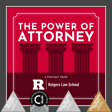
S6E9: RICAP, Rutgers' Rapid Response Program, and Protecting International Students
Rutgers Law School Professor David Noll guest hosts this special conversation with Dean Johanna Bond; Professor Randi Mandelbaum, Associate Dean for Clinical Education at Rutgers Law School in Newark; and Jason Hernandez, Director of the Rutgers Immigrant Community Assistance Project (RICAP). The group discusses some of the latest concerns facing international students, resources available to them through RICAP, and the formation of the rapid response team that is providing aid to students encountering emergency immigration circumstances. You can read more about RICAP here.
If you are a Rutgers student who has immigration concerns, we encourage you to contact RICAP. To request an appointment or to learn more about RICAP, please email RICAP-info@law.rutgers.edu or call 856-225-6568.
UPDATE: The Trump administration has reversed course on student visa cancellations, but the need for litigation is still extant.
--
The Power of Attorney is produced by Rutgers Law School. With two locations minutes from Philadelphia and New York City, Rutgers Law offers the prestige and reputation of a large, nationally known university combined with a personal, small campus experience. Learn more by visiting law.rutgers.edu.
Executive Producer: Shanida Carter
Series Producer & Editor: Nate Nakao


